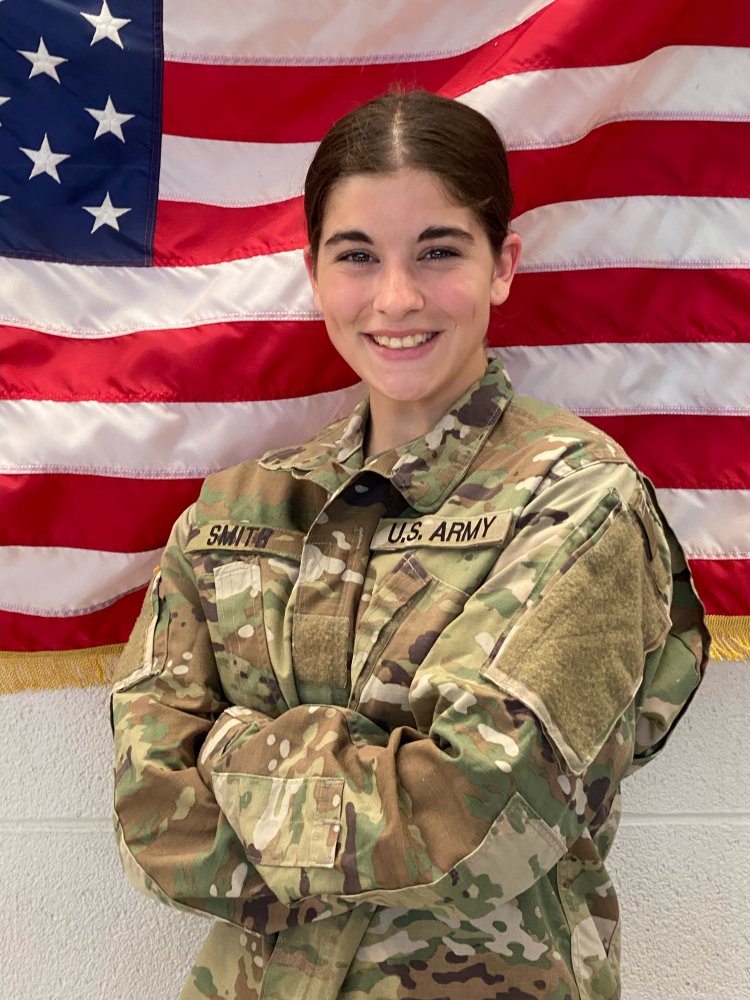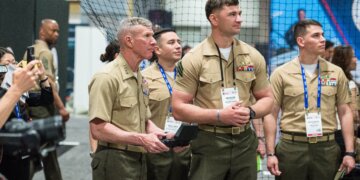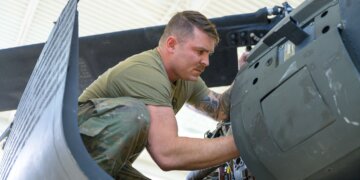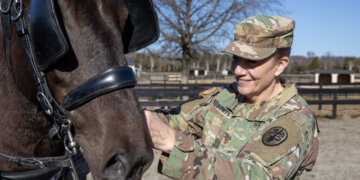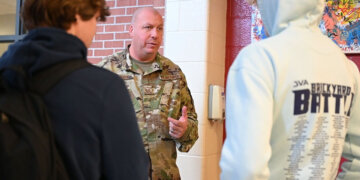Ashlyn Smith was 17 when she enlisted in the Missouri National Guard in March, so her mother, father and stepfather all accompanied her to the recruiting office to sign permission papers.
“I’ve always wanted to go into the military, even when I was a kid,” said Ashlyn, who is now 18 and graduated in June from high school in Wentzville, Missouri. “I thought it was really cool to be able to serve our country.”
To achieve her goal, Ashlyn — whose grandfathers and stepfather served in the military — had to jump through a few extra hoops.
She had benign rolandic epilepsy, a form of childhood epilepsy, from about age 11 to 15, so she had to submit all her medical documents and wait a few months to get the OK from the National Guard, she said.
Ashlyn is the exception among her peers: an internal Department of Defense survey showed only 9% of young people eligible to serve in the military had any inclination to do so, the lowest number since 2007, NBC News reported in June.
All branches of the military have had difficulties in meeting their recruiting goals this fiscal year, according to widespread reports.
“As a whole … we’re struggling,” said Staff Sgt. Sokthey Tum, a recruiter for the Rhode Island National Guard.
RELATED: Units use unique recruiting events to entice enlistment
Still, Rhode Island, the smallest state in the country, ranked No. 20 in recruiting success among all 54 states and territories, he said.
The main obstacle, according to Tum, is for recruits to meet medical fitness standards. Obesity is one of the leading medical reasons that young adults are disqualified from joining the military, according a 2020 report by the Congressional Research Service.
When it comes to young people enlisting, tradition makes a difference. A total 83% of recruits come from military families, Army Chief of Staff Gen. James C. McConville said during a July visit to Fort Leonard Wood, Missouri.
Like for Ashlyn, that was the case for Luis Urizar, 17, of Providence, Rhode Island, whose grandfather served in the Guatemalan Armed Forces.
Luis signed up for a three-year contract with the Rhode Island Army National Guard. He graduated high school in June; after he’s done with training early next year, he plans to study architectural engineering.
Luis said he’s already learned a lot ahead of basic combat training, thanks to the National Guard’s Recruit Sustainment Program.
“We had a medical field training, that was probably the most interesting thing I’ve learned,” he said. “Also, assembling and disassembling a machine gun, and map navigation.”
Figuring out how to pay for college would have been stressful for his parents, he said.
“I feel like now I have a path into my future and they don’t have to worry. Or not as much,” Luis said.
When dealing with potential recruits, recruiters must be accurate and never over-promise, Tum said.
“That’s the big part — building the trust of the kids.”
Trust comes from word of mouth, Tum said. When a recruit’s enlistment documents don’t match the recruiters’ assertions — such as about duty station assignments or amount of tuition reimbursement — word gets around on social media and among friends, he said.
Staff Sgt. Koty Bennett, of the Chicago Army Recruiting Battalion, said a big part of the job is reassuring people that anybody can succeed at military training, and that the military treats its people well.
“It’s about the individual,” he said. “You’ve got to find what their buy-in motive is, what’s going to help them benefit the most. Learning about that person and trying to develop a plan for that individual person, and showing how the Army can help them develop the best.”
Getting college credits, learning trades and earning things like commercial drivers’ licenses can be especially beneficial to youths from modest means, he said.
As for those who say the military targets low-income youths, Bennett pointed to his own background.
“I grew up pretty well off, my parents worked hard,” he said. “For me, it (my motivation) was paying for college.”
Ashlyn said paying for her education was “a little bit of a concern.” She decided on a six-year contract with the Missouri National Guard after her recruiter explained how getting an EMT license would be a great starting point in life, she said.
She enlisted as a combat medic specialist and will start basic training in early August. She might work for a fire department, and medical school is a possibility in the future, she said.
Allison Melendez, 21, of Kouts, Indiana, considered joining the military in high school, and eventually did so in college. She enlisted with the Indiana Army Reserve in March during her junior year at Valparaiso University, where she’s studying criminal justice.
“A lot of recruiters came to my (high) school, and I always spoke with them and always kept their cards,” she said. “I had been thinking about it, but I didn’t have the capacity or the maturity to make that decision at that point. I am glad I lived my life a little bit and experienced things a little bit (before enlisting).”
She’s also glad the Army’s financial aid will help pay for some of her undergraduate school loans and her future master’s degree, she said. She’s looking forward to widening her career opportunities and might want to join the FBI someday, she added.
“That military stamp can help you in the job world,” Allison said. “It can put your resume on top of a lot of stacks.”
Read comments


